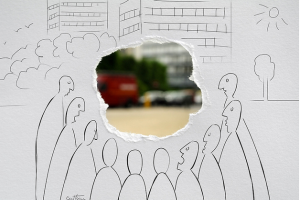We’re Not Social Media ‘Chips’
Posted on September 11, 2011
Filed Under Technology | Leave a Comment
Here from Ivan Walsh is an interesting effort to equate the use of social media by humans with a computer’s operating system. It notes that an operating system includes “software that supports a computer’s basic functions, such as scheduling tasks, executing applications, and controlling peripherals” and includes “multiuser, multiprocessing, multitasking, multithreading and real-time operating systems.”
The big difference, though, is that an operating system is largely automatic. Learning social media takes time and is largely happenstance – it’s a far more random process than a computer chip allows – at least I’ve found it so.
What both computers and social media have in common, though, is, “forming and enabling a potentially massive community of participants to productively collaborate.” And they both operate under the same hood (whether Mac or PC). They’re forms of applied technology, though social media seem much more happenstance in learning than I remember my first computers to be. (And watch out, I just discovered, for spammers on Facebook.)
I wouldn’t push too far Walsh’s notion of social media as “an operating system for humans.” That’s an interesting concept and, obviously, a trigger for discussion. But social media involve more of an agglomeration of randomness than, I trust, any computer ever will. That may be the nature of humanity – to take paths that suddenly open and lead to new associational vistas, mental and emotional. Computers are more directed, controlled and, indeed, programmed to stick to the relatively straight and narrow than humans will ever be.
Encore’s Dennis Owen offers that a more apt analogy is to “a really good cocktail party. Social media has some advantages,” Dennis continues. “You could never fit that many people into a cocktail party, even in Bill Gates’ house. Unlike most cocktail parties, which are drawn from an existing social network, you meet people from different walks of life. But it has one major disadvantage: It’s much easier to take the measure of someone face to face.”
 Walsh argues that, because we’re “inside” the social media realm it’s hard for us to see how it operates. But why would we then be spending varying amounts of time – depending on our interests – in learning to use Twitter, Facebook and LinkedIn, for instance? If we were “inside” the system, wouldn’t we be utterly under its control, even if unaware of that as our fate?
Walsh argues that, because we’re “inside” the social media realm it’s hard for us to see how it operates. But why would we then be spending varying amounts of time – depending on our interests – in learning to use Twitter, Facebook and LinkedIn, for instance? If we were “inside” the system, wouldn’t we be utterly under its control, even if unaware of that as our fate?
The good news about social media is that its channels are truly a means of gaining insight and extending influence among an array (possibly vast) of people we wouldn’t otherwise have a prayer of meeting. They extend horizons and aspirations, provide counsel and condolences, all from our self-directed computer keyboard and screen. They can, indeed, enable “a potentially massive community of participants to productively collaborate.”
Social media, in short, extend our reach almost unimaginably. What we do with our newly gained insights and associations is up to us. We’re not chips off the old (or new) social media block. – Doug Bedell
Comments
Leave a Comment
If you would like to make a comment, please fill out the form below.
Recently
- Presentations With Forethought
- Technical Writing’s Lineage – Surely It’s Deeper than Digital
- At the Holidays, Twitting Amazon
- Successful Cookie Baking – From Mom, an Acknowledged Expert
- Slides for a Tech Writer’s Craft
- Digital or Not, Be Clear
- Being Watchful About Digital Designs…
- When Proposals Don’t Click, Keep Making Them Anyway
- Like a Good Gardener, Help an Enterprise Keep Itself Current
- We’re Leaders All, And Need to Think That Way
Categories
Archives
- January 2017
- December 2016
- November 2016
- October 2016
- September 2016
- August 2016
- July 2016
- June 2016
- May 2016
- April 2016
- March 2016
- February 2016
- January 2016
- December 2015
- November 2015
- October 2015
- September 2015
- August 2015
- July 2015
- June 2015
- May 2015
- April 2015
- March 2015
- February 2015
- January 2015
- December 2014
- November 2014
- October 2014
- March 2014
- February 2014
- January 2014
- December 2013
- November 2013
- October 2013
- September 2013
- August 2013
- July 2013
- June 2013
- May 2013
- April 2013
- March 2013
- February 2013
- January 2013
- December 2012
- November 2012
- October 2012
- September 2012
- August 2012
- July 2012
- June 2012
- May 2012
- April 2012
- March 2012
- February 2012
- January 2012
- December 2011
- November 2011
- October 2011
- September 2011
- August 2011
- July 2011
- June 2011
- May 2011
- April 2011
- March 2011
- February 2011
- January 2011
- December 2010
- November 2010
- October 2010
- September 2010
- August 2010
- July 2010
- June 2010
- May 2010
- April 2010
- March 2010
- February 2010
- January 2010
Blogroll